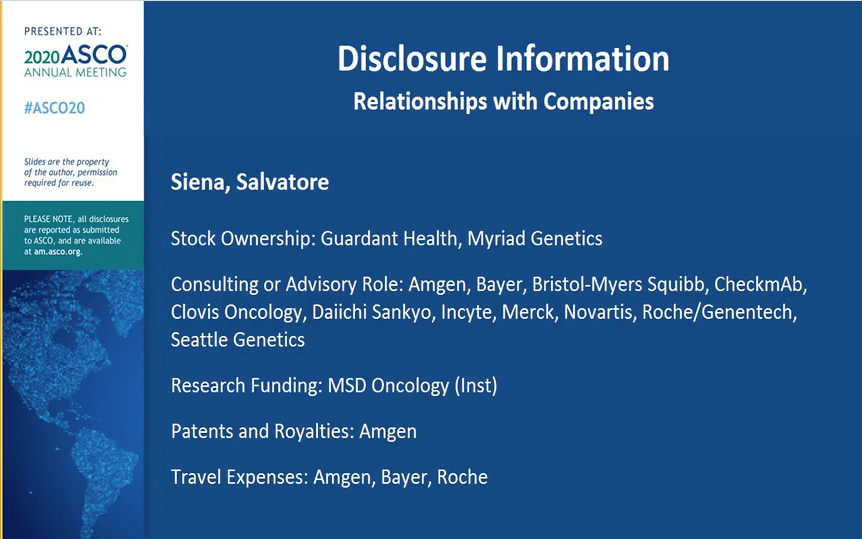Larotrectinib is a highly selective TRK inhibitor that is approved to treat adult and paediatric patients with solid tumours harbouring an NTRK gene-fusion. In clinical trials, larotrectinib demonstrated a 79% objective response rate and over 35 months median duration of response, regardless of tumour type and age [1]. The drug was well tolerated with mainly grade 1 or 2 adverse events.
To get more insight in the efficacy of larotrectinib on quality of life, quality of life outcomes were analysed from an expanded dataset of adults, children, and infants with TRK fusion cancer treated with larotrectinib in 2 ongoing trials: a phase 2 basket trial in adults and adolescents (NAVIGATE) and a single-arm phase 1/2 trial in paediatric patients (SCOUT). Patients completed validated quality of life questionnaires at baseline and at planned cycle visits. In the case of younger children and infants, the questionnaires were completed by their parents. Best changes in scores from baseline and during treatment were compared to the Minimally Important Difference (MID), which is the smallest difference in score that patients perceive as beneficial or detrimental [2]. At data cut-off, 126 patients (74 adults, 24 children ≥2 years of age, and 28 infants ≤2 years of age) had received larotrectinib and completed baseline and at least one post-baseline questionnaire.
At baseline, 70% of the adults reported a normal or above normal quality of life. During treatment with larotrectinib, 98% of these patients remained in that category. For 91% patients who reported quality of life below normal at baseline, treatment with larotrectinib led to quality of life improvement. Reported improvement reached or exceeded the MID in 59% of patients. MID improvements were reported for most tumour types. Of note, all 10 patients with brain metastases had clinically meaningful improvements in quality of life.
Similarly, at baseline, 38% of children ≥2 years reported a normal or above normal quality of life; in all of these children, quality of life remained normal/above normal during treatment with larotrectinib. Treatment with larotrectinib improved quality of life in 67% of the children ≥2 years who reported quality of life below normal at baseline. A total of 88% of the children had quality of life improvements, in 79% reaching or exceeding the MID, also across tumour types.
A categorisation analysis for infants ≤2 years of age was not possible, as there is no accepted normal range for this group. General quality of life improvement during treatment with larotrectinib was reported in 82% of the infant patients, with MID improvements reported in 57%, again observed across all tumour types.
Among evaluable patients, 47% of adults, 75% of children, and 43% of infants had quality of life improvements that lasted for at least 2 consecutive cycles. The onset of these sustained quality of life improvements were rapid, occurring by 2 months of treatment in 69% of adults, 75% of children, and 61% of infants. The median duration of the quality of life improvements was 12 months in adults and not estimable in children and infants.
- Hong DS, et al. Lancet Oncol. 2020;21: 531-540.
- Kummar S, et al. ASCO Virtual Meeting, 29-31 May 2020, Abstract 3614
Posted on
Previous Article
« Promising first immunotherapy trial in placental trophoblastic tumours Next Article
EHA25 Highlights Podcast »
« Promising first immunotherapy trial in placental trophoblastic tumours Next Article
EHA25 Highlights Podcast »
Table of Contents: ASCO 2020
Featured articles
COVID-19 & Telemedicine
COVID-19 and Cancer Consortium Registry: initial results
Oncology hospital-at-home model reduces hospitalizations, emergency department visits, and costs
Nurse-led telephone triage system reduces hospitalizations, helps patients manage symptoms at home
Melanoma
Adjuvant pembrolizumab: durable RFS for stage III melanoma
Adjuvant pembrolizumab: durable RFS for stage III melanoma
Pembrolizumab plus low-dose ipilimumab well tolerated after progression on PD1 antibody therapy
Toripalimab plus axitinib effective in metastatic mucosal melanoma
Breast & Ovarian Cancer
Advanced breast cancer: locoregional therapy does not improve OS
T-DM1 does not improve safety or efficacy in HER-2 positive early breast cancer; favorable iDFS reported
Maintenance olaparib improves OS in relapsed ovarian cancer with BRCA1/2 mutation
Combination pembrolizumab/chemo improves PFS in metastatic TNBC
Effect of veliparib with or without cisplatin in breast cancer: results of SWOG S1416
PHOEBE, a phase 3 trial comparing pyrotinib and lapatinib in HER2-positive metastatic breast cancer
BYLieve demonstrates efficacy of PIK3CA-directed treatment post CDK4/6-ihibition
Strategies emerge for chemotherapy de-escalation in HER2-positive breast cancer
Multiple Myeloma
Carfilzomib: no PFS benefit for multiple myeloma
Lung Cancer
ES-SCLC: tremelimumab + durvalumab + chemotherapy misses endpoint
Adjuvant osimertinib in NSCLC: practice changing ADAURA trial
ES-SCLC: pembrolizumab KEYNOTE-604 data
Second-line gemcitabine plus ramucirumab significantly improves overall survival
Tiragolumab and atezolizumab: ORR in NSCLC
MET-amplified advanced NSCLC responds well to MET inhibitor capmatinib
Genitourinary Cancer
Urothelial cancer: avelumab works as maintenance therapy
ARAMIS final OS and nmCRPC safety outcomes
Final survival results from phase 3 SPARTAN trial
Novel drug for kidney cancers/VHL patients
Primary analysis from IMvigor010, adjuvant atezolizumab in high risk muscle-invasive urothelial carcinoma
First randomised trial of Lu-PSMA in mCRPC progressing after docetaxel
Gastrointestinal Cancer
HER2-expressing metastatic colorectal cancer: trastuzumab deruxtecan
REGOMUNE: a phase 2 study combining regorafenib and avelumab
Cardiotoxicity: consider switching to S-1
Perioperative chemotherapy for resectable pancreatic ductal adenocarcinoma
Real-world data of sequential sorafenib followed by regorafenib in unresectable HCC
Paediatric Cancer
Sustained improvements in quality of life with larotrectinib
Promising first immunotherapy trial in placental trophoblastic tumours
Precision medicine for poor-prognosis paediatric patients
Related Articles

September 17, 2020
HER2-expressing metastatic colorectal cancer: trastuzumab deruxtecan
© 2024 Medicom Medical Publishers. All rights reserved. Terms and Conditions | Privacy Policy
HEAD OFFICE
Laarderhoogtweg 25
1101 EB Amsterdam
The Netherlands
T: +31 85 4012 560
E: publishers@medicom-publishers.com

